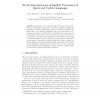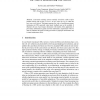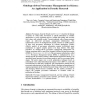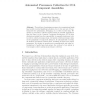CCGRID
2006
IEEE
14 years 6 months ago
2006
IEEE
Provenance is generally defined as the documentation of a process that leads to some result, and has long been recognised as being fundamental to the development of problem solvi...
ICDT
2007
ACM
14 years 6 months ago
2007
ACM
Abstract. Information concerning the origin of data (that is, its provenance) is important in many areas, especially scientific recordkeeping. Currently, provenance information mu...
ICCBR
2007
Springer
14 years 6 months ago
2007
Springer
Case-based reasoning systems routinely record the results of prior problem-solving, but not the provenance of new cases: the way in which the new cases were derived. This paper pro...
DBPL
2007
Springer
14 years 6 months ago
2007
Springer
Abstract. Provenance is information recording the source, derivation, or history of some information. Provenance tracking has been studied in a variety of settings; however, althou...
BTW
2007
Springer
14 years 6 months ago
2007
Springer
: In many application areas like e-science and data-warehousing detailed information about the origin of data is required. This kind of information is often referred to as data pro...
ATAL
2007
Springer
14 years 6 months ago
2007
Springer
Determining the provenance of data, i.e. the process that led to that data, is vital in many disciplines. For example, in science, the process that produced a given result must be...
SDMW
2009
Springer
14 years 6 months ago
2009
Springer
Abstract. Database provenance chronicles the history of updates and modifications to data, and has received much attention due to its central role in scientific data management. ...
OTM
2009
Springer
14 years 6 months ago
2009
Springer
Provenance, from the French word “provenir”, describes the lineage or history of a data entity. Provenance is critical information in scientific applications to verify experime...
ICCS
2009
Springer
14 years 6 months ago
2009
Springer
The problem of capturing provenance for computational tasks has recently received significant attention, due to the new set of beneficial uses (for optimization, debugging, etc.)...
0
posts
with
0
views
0
views






